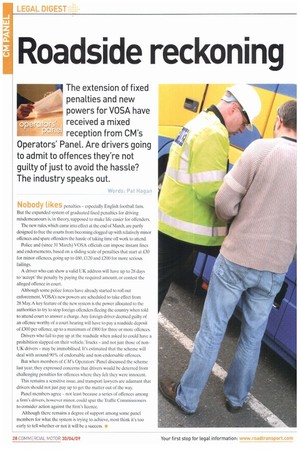Roadside reckoning
Page 28

If you've noticed an error in this article please click here to report it so we can fix it.
The extension of fixed penalties and new powers for VOSA have received a mixed reception from CM's Operators' Panel. Are drivers going to admit to offences they're not guilty of just to avoid the hassle?
The industry speaks out.
Words: Pat Hagan
Nobody likes penalties—especially English football fans. But the expanded system of graduated fixed penalties for driving misdemeanours is, in theory, supposed to make life easier for offenders.
The new rules, which came into effect at the end of March, are partly designed to free the courts from becoming clogged up with relatively minor offences and spare offenders the hassle of taking time off work to attend.
Police and (since 31 March) VOSA officials can impose instant fines and endorsements, based on a sliding scale of penalties that start at £30 for minor offences, going up to £60, £120 and £200 for more serious failings.
A driver who can show a valid UK address will have up to 28 days to 'accept' the penalty by paying the required amount, or contest the alleged offence in court.
Although some police forces have already started to roll out enforcement. VOSA's new powers are scheduled to take effect from 28 May. A key feature of the new system is the power allocated to the authorities to try to stop foreign offenders fleeing the country when told to attend court to answer a charge. Any foreign driver deemed guilty of an offence worthy of a court hearing will have to pay a roadside deposit of £300 per offence, up to a maximum of £900 for three or more offences.
Drivers who fail to pay up at the roadside when asked to could have a prohibition slapped on their vehicle.Trucks — and not just those of nonUK drivers — may be immobilised. It's estimated that the scheme will deal with around 90% of endorsable and non-endorsable offences.
But when members of CM's Operators' Panel discussed the scheme last year, they expressed concerns that drivers would be deterred from challenging penalties for offences where they felt they were innocent.
This remains a sensitive issue, and transport lawyers are adamant that drivers should not just pay up to get the matter out of the way.
Panel members agree — not least because a series of offences among a firm's drivers, however minor, could spur the Traffic Commissioners to consider action against the firm's licence.
Although there remains a degree of support among some panel members for what the system is trying to achieve, most think it's too early to tell whether or not it will be a success. •












































































































































